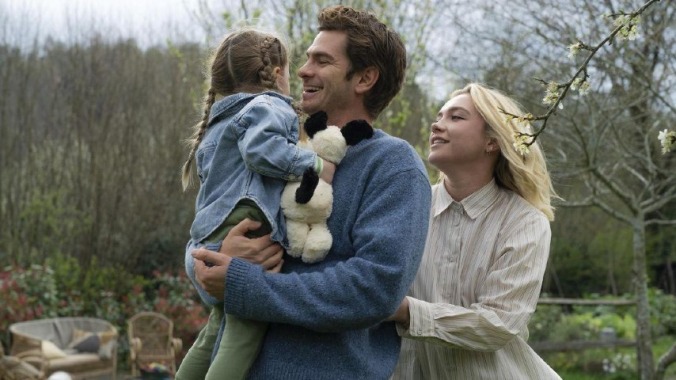In Defense of Almut’s Pregnancy in ‘We Live in Time’
Aren't we all hypocrites for the right—and wrong—person?
Photo Credit: A24 EntertainmentMovies
Since its October 18 release, We Live in Time has been deemed a “triumph,” a “heartfelt weepie,” and a “deeply affecting tear-jerker.” It’s also on track to become the highest-grossing limited release of 2024, with the film earning a staggering $1.8 million on its opening day despite debuting in less than 1,000 theaters nationwide. Personally, I think the accolades are well-earned, even if many critics have accused it of being, well, pro-birth at a time when the U.S. continues to prove hostile to women who choose not to give birth.
Andrew Garfield plays Tobias, who is a down-on-his-luck, divorced Weetabix IT man when he meets Florence Pugh’s Almut, an ambitious, effervescent chef. We’re whisked through three distinct, albeit out-of-order chapters throughout the course of their 10-year relationship, witnessing everything from their first meeting (Almut hits Tobias with her car) to their first realization that they’re competing against a particularly cruel clock (Almut is diagnosed with Stage 3 cancer). There have been some complaints about the film’s timeline and how its incessant toggling from one phase to another impedes the intensity of its most poignant moments, but the harshest criticism lands on Tobias and Almut’s personal decisions, namely, Almut’s out-of-character decision to have a baby.
When the couple’s only conflict apart from the Big C is introduced (Almut doesn’t care to procreate, but Tobias does), we’ve already learned that Almut isn’t a woman who bends to convention, let alone the whims of a man. But bend she most certainly does—despite the grim reality of her health. In the middle of the film, after Almut’s told she has ovarian cancer for the first time, she’s forced to decide between undergoing a partial or full hysterectomy. Obviously, a full hysterectomy offers her a better chance of not eventually dying from the disease. Yet, despite all her demonstrably sound sense, she takes the risk and opts for the partial, since she’s now suddenly invested in the idea of having a child with Tobias. Then, some years after she does, she’s given the death knell we all saw coming. It would be a confounding choice—even for someone who’s desperately wanted to bear children for their entire adult life. Almut, however, doesn’t fall within that category. That said, her repeated diagnoses do just seem like an unfair punishment.
-

-

-

-

-

-

-

-

-

-

-

-

-

-

-

-

-

-

-

-

-

-

-

-

-

-

-

-

-

-

-

-

-

-

-

-

-

-

-

-








































